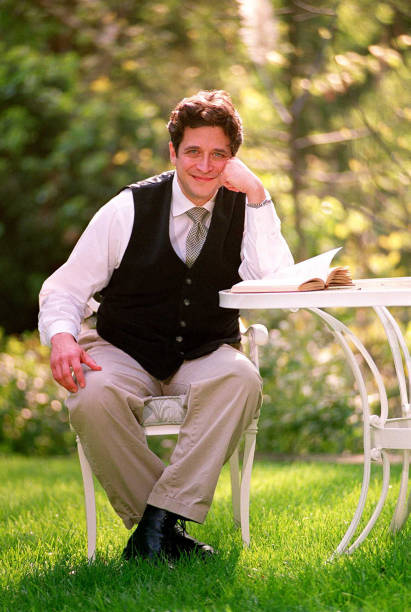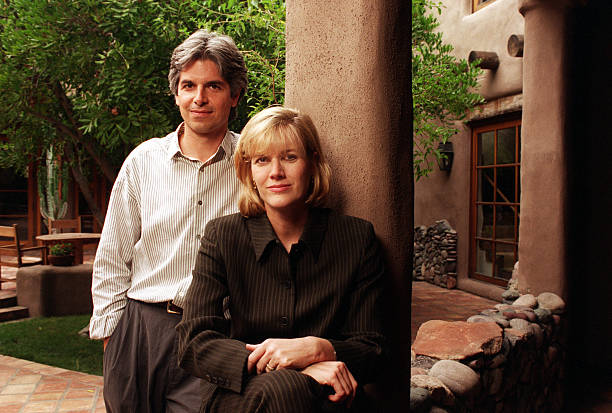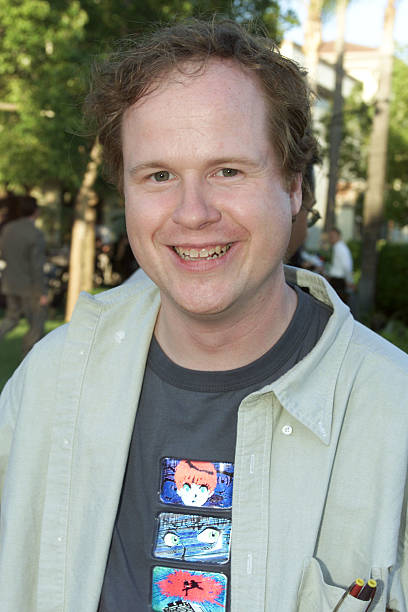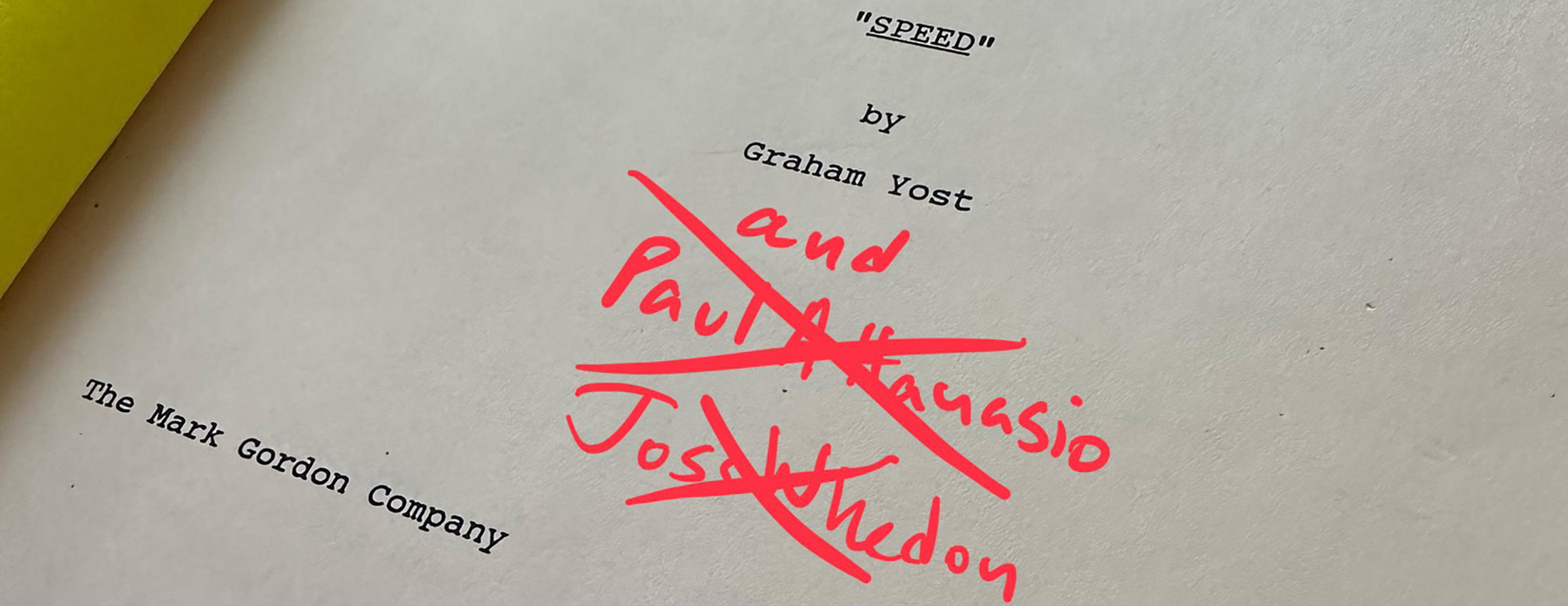On the Chaos of an 11th-hour Rewrite
So far, we have met and established the director of Speed and its two central stars. The film is hurtling toward a Labor Day 1993 production start. So, right around now, 30 years ago, is when everything discussed in today’s episode of 50 MPH was going down. Speed has a green light. It’s ready to go. Production is imminent. But, the brass at 20th Century Fox is about to pull a standard cover-your-ass maneuver.
“We’re basically on the verge of shooting,” former Fox executive Jorge Saralegui says. “The studio decides that Graham [Yost] has taken it as far as it can go and that we need somebody to punch up the characters, so, the studio does what I’ve always thought was a bad idea, starting with this bad experience, but I still think it’s one of the dumbest things that Hollywood does over and over again, which is, they have something that’s either good enough or maybe needs something else, but the person you have to hire has to be somebody super expensive. And you pay them an arm and a leg because it’ll elevate it that last little bit, and, I have a feeling, that if it doesn’t, you can say, ‘Well, Jesus, I hired,’ you know, whoever. And this is the only name that I’m going to give to you, like, in a negative light, because it pissed me off. So, it’s Paul Attanasio.”

Shots fired! What would happen next would become, in the eyes of Saralegui and in the eyes of a number of people involved with the film, an 11th-hour crisis for Speed. Screenwriter Paul Attanasio is, at this time, what they call a “script doctor.” This is before he’s the Oscar-nominated writer of movies like Quiz Show and Donnie Brasco. He’s someone who comes in to, as Saralegui says, take a piece of material to the next level.
“I used to do a lot of script doctoring in that period, and I loved it,” Attanasio says. “I don’t know if you’re a baseball fan. It’s like being the closer. It’s like coming in and you throw gas and the crowd loves you and you go home. In this instance, I was more like the set-up man, like they eighth-inning man, as it turned out.”
There were a couple of things that Attanasio specifically wanted to do to the script. First, as he recalls, he wanted to have a “best friend” character who gets killed at the end of the second act. Then he wanted to cut away to other drama and action in order to punctuate the bus journey. At the time, the entire second act took place on the bus and the story never cut away to things like Harry elsewhere tracking down the bad guy, because Harry was actually taking the spot that Joe Morton’s Lieutenant MacMahon would eventually fill, being on the flatbed truck alongside the bus as it’s roaring through Los Angeles. Alas, according to Attanasio — at this point in time, anyway — Saralegui and producer Mark Gordon weren’t interested in doing any of that that. But he went about his work anyway, turned in his draft and caused absolute chaos.
“He made the script clearly worse,” Saralegui says. “You know, just thinking about it infuriates me. The ego of people like that, to come in and, instead of just steal the money you’re being given, you have such contempt for the material that you decide, ‘No, I’m going to change this, I’m going to change that,’ and you don’t know what the fuck you’re doing.”
Adds Gordon: “We gave him specific instructions and he just kind of went off and did what he did, and he was paid a fuck-load of money.”
There are lots of faulty memories about what, exactly, Attanasio would ruin with his work, but we’ll break it down as best we can with the drafts available to us. In the meantime, with the studio paying Attanasio and showing him the door — and, again, with mere weeks to go until it’s time for cameras to roll — Saralegui finds himself in a pickle.
“I did two things at once,” Sarelegui recalls. “I called up Walter Parkes, who, by the way, is probably the only name producer I even know [at the time], because he tried to hire me to be a story editor, which is how I became a junior executive at Fox. I said, ‘Walter, would you look at this thing and I have a writer in mind who I think could do it. So, could you look at it, talk to this writer and see if you think that there’s a way to solve the problems that have just been created?’ And he goes, ‘OK, who’s the writer?’ And I said, ‘Joss Whedon.'”

Before we get to Whedon, Walter Parkes was, at the time, the revered screenwriter behind films like WarGames and Sneakers. Along with his wife and producing partner Laurie Macdonald, he was a respected mind in the business. The duo had a development deal at Fox for a period and were very soon set to run Steven Spielberg’s Amblin Entertainment.
“It almost felt like the producer’s version of a last-minute production rewrite,” Parkes recalls of his and Macdonald’s Speed duties. “It seemed like there were issues with the script, issues getting the cast together. Clearly there was a very commercial movie there, but yeah, there were some problems.”
Adds Macdonald: “The premise was so insane, in a way, so ridiculous, and yet, so delightful. And the script wasn’t working, but we read it and it was a kind of challenge we had never taken on before, coming in so late to something, and we thought it would be interesting.”
Now, Joss Whedon. Over the years, Whedon has received a lot of credit for what’s on the screen in Speed. Most surmise that 90% of the dialogue is attributable to him and his sense of tone. At the time, of course, he’s still years away from lording over a television empire that would include Buffy the Vampire Slayer, Angel and Firefly, and even farther from career heights as the director tasked by Marvel Studios with bringing their marquee superheroes together in The Avengers and Avengers: Age of Ultron. He’s made his name on an unproduced script called Suspension and a feature version of Buffy that Fox acquired and, essentially, ruined. Through that, he’s landing script-doctor gigs, working under the hood to “fix” screenplays and get them ready for production.
“I think there was some very old-fashioned writing in the sense of, like, everybody had a backstory,” Whedon recalls of the Speed script he was asked to revise. “Everybody had a moment, you know, whatever baggage they were bringing along, and there were some moments that were kind of florid and speeches and stuff where maybe people should not have a speech. And this is from a guy who never shuts up. I mean, his characters, either.”
But more importantly, Whedon sees in the material the opportunity to really shake up the action-movie status quo.

“Speed is, I think, with Die Hard, the sea change where we went from, you know, ‘You’re out of control!’ ‘You’re a hot shot!’ ‘You’re a maverick!’ ‘You’re a renegade!’ to, ‘I am going to try to make the people live in this situation,'” he says. “Like, much more relatable, down-to-earth kind of people in these situations, and less deliberately sort of driving down sidewalks to catch somebody. And in fact, he’s not trying to catch somebody. He’s trying to save people.”
Whedon swoops in, assists in saving the day and helps throughout production when director Jan de Bont needs a line here and there. Given the workload, he expects a credit on the film, but in the end, the Writers Guild would rule otherwise.
“Where things went bad between us is when he didn’t get any credit, and he was not happy when we ran into each other at the premiere,” Yost says. “And it was like he was blaming me. It was like, ‘Dude, that’s the WGA. Of course I’m going to write a letter saying I deserve sole credit. I sat with that thing for years. That’s my baby.'”
Whedon remembers the exchange differently.
“Graham Yost came up to me the night it opened,” he says. “Fox was having a little party on the lot because they were so excited, and we hadn’t met, and he came up, and we were polite and all, and he was like, ‘You know, man, you’d have done the same thing.’ And I was like, ‘Well, we can’t know that, can we?’ That got me. That really upset me, because it’s not true.”
And this is all just scraping the tip of the iceberg. What had Attanasio actually done to upset everyone on the project? How much of his work in fact survives in the finished product? Perhaps more importantly, who is responsible for the film’s most legendary line, “pop quiz hot shot”? Everyone has always attributed it to Whedon.
“I cannot take credit for it, for it is not mine,” Whedon admits.
Follow us down the rabbit hole as we seek out the answer to those and many more questions, this week on 50 MPH!
